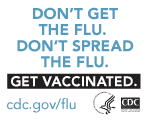About CDC
Hot Links
Conferences & Events
Outbreak: Plagues that changed HistorySeptember 27 – January 30, 2009
Organized by the Global Health Odyssey Museum; come see Byrn Barnard’s images of the symptoms and paths of the world’s deadliest diseases – and how the epidemics they spawned have changed history forever.
CDC Secretaries
CDC secretaries provide critical support to programs and staff. They keep managers organized their tasks range from handling correspondence and maintaining daily appointment calendars, to coordinating travel and facilitating review of processes.
Currently, CDC* has 161 full-time secretaries as employees, while just a little more than a decade ago the agency employed more than 400. Fewer in number today, these staff members, nevertheless, play key roles in the agency´s smooth operation. Six secretaries are spotlighted here as part of a continuing series highlighting various jobs and the people who work in them.
Marie Chovanec, Secretary, Office of the Director, Office of Mine Safety and Health, NIOSH, Pittsburgh
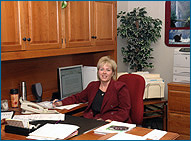
It´s been a busy year for Marie Chovanec as secretary for the Office of Mine Safety and Health Research and the NIOSH senior science advisor. Part of that is due to the passage of the Mine Improvement and New Emergency Response Act of 2006, also known as the MINER Act.
Chovanec supports the associate director for Mining and Construction and coordinates activities for the office. She also serves as the administrative contact for information related to the NIOSH Mining Program.
"We strive to eliminate mining fatalities, injuries, and illnesses through research and prevention," says Chovanec, who joined CDC in 1997 when the mining program became part of NIOSH. She had been with the former Bureau of Mines since 1989. "I really enjoy interacting with and helping people and I particularly enjoy interacting with people, who represent our nation´s mineworkers."
Currently, the most challenging part of her job is mastering GovTrip, CDC's travel management system. While this new system has presented challenges, overall automation has expanded the role of secretaries by giving them time to expand their jobs into other areas, says Chovanec. She adds that successful secretaries are detail-oriented, good listeners, and excellent communicators who excel at multi-tasking.
Before becoming a government employee, Chovanec worked as a bookkeeper in the private sector for 12 years. She and her husband are classic car enthusiasts and "parents" to a St. Bernard and cat.
Jean Kelly, Secretary, Division of Health Assessment and Consultation, ATSDR*
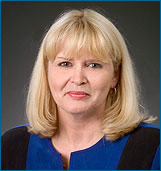
9/11. That was Jean Kelly´s first day on the job as a secretary in the Health Investigations Branch of the Division of Health Studies in NCEH/ATSDR.
"As soon as the planes hit the towers, our division management reacted immediately by preparing our subject-matter experts to travel up to New York City to assist in various ways, one of which was to set up the registry of the folks affected. As I watched everyone´s rapid readiness response, it gave me an awesome feeling to know how much CDC is needed and respected in the public health arena," recalled Kelly, who spent 28 years as a secretary and administrative assistant in the corporate sector before starting her government career.
In 2004, Kelly became secretary to the director in the Division of Health Assessment and Consultation, the largest of ATSDR´s four divisions. "Our work addresses releases of substances from hazardous waste sites, including those we get as petitions," Kelly says.
She notes that a growing number of Americans are affected by toxic contaminants. "The number of requests, compared to the number of staff we have to respond, keeps us very busy," she says.
ATSDR recognized her support for the division´s operations with the 2006 NCEH/ATSDR Excellence in Administrative Support Award. Kelly also received the CDC Employee of the Month Award in April 2004 in her role with the Division of Health Studies.
Kelly is thankful for being selected to participate in CDC´s Mentoring Program in 2002—2003. "I received invaluable networking opportunities during my involvement during the program and afterwards that enhanced my CDC career opportunities." In fact, Kelly has since served as a liaison for two mentoring pairs in the 2004—2005 program.
"My parents were my first mentors and role models, encouraging me to be the best I can be, and to help those around me," she says. An avid gardener, Kelly is married with two grown children, a son, 28, and stepdaughter, 38. She earned an associate degree in data processing from Winston-Salem College in Winston-Salem, NC.
Elfrieda Alston, Secretary, Office of Communication Resources, NCIPC
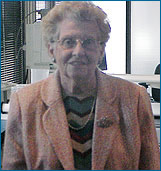
Permanent retirement from CDC is not in Elfrieda Alston´s vocabulary. She has returned to CDC after retiring on two occasions, once in 1987 and the other time in 1994.
"There´s something special about CDC and its personnel that keeps me coming back," says Alston, whose career as a secretary has taken her to far-away places, including Morocco. During the Korean War in the 1950s, Alston worked as a civilian secretary with the US Air Force assigned to the budget department in Morocco´s capital of Rabat during a time of French control.
She first joined CDC in 1982 but left for about 18 months before returning to the agency in 1984, where she worked on the Agent Orange project. Since 1990, she has worked in NCIPC in the Office of Communication Resources. She was involved in the 2nd World Conference on Injury Control held in Atlanta.In 2005, Alston received CDC´s Public Health Secretarial Support Award for outstanding service. She thinks the role that secretaries play is important at CDC.
Of her current job, Alston expresses pride in the public-facing role the Center has in preventing and controlling injuries. "The people at NCIPC are dedicated and are doing a great service in promoting injury prevention and control to the public. This Center provides many resources to the public-–from fall prevention checklists for older adults, to facts about concussion and brain injury, to preventing suicide and youth violence, and violence against women."
Widowed and the mother of one son, who recently passed away, Alston plans to continue working at CDC for the foreseeable future. "I enjoy my work and the association with my fellow workers. I feel as if they are my family," she concludes.
Margaret (Maggie) Ivory, Secretary, Division of Applied Research and Technology, NIOSH, Cincinnati
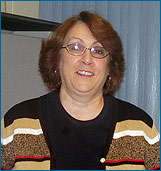
Enjoying the camaraderie of office staff and being able to make someone else´s job easier are the best aspects of Maggie Ivory´s work in NIOSH´s Cincinnati-based Division of Applied Research and Technology (DART).
She joined NIOSH in 1973 and currently supports the division director by keeping her schedule and appointments and coordinating travel, among other duties. DART´s main role is developing and/or evaluating methods, processes, and strategies to eliminate or prevent occupational injuries and illnesses in the workplace.
"The most challenging aspect of the job in the past few years has been keeping up with system and technology changes. Being a successful secretary takes a lot of adaptability and patience," she adds. "The job has changed from ´command driven´ to ´self-initiated and self-motivated work´ due to the information technology explosion."Ivory worked in the private sector for five years before joining NIOSH. She shares a home with her sister, niece, mother, and five pets (three cats and two dogs). In her free time, she enjoys reading, dining out, and taking beach vacations.
Monica Deckers, Secretary, Division of Vital Statistics, NCHS, Hyattsville, MD
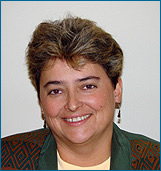
Multi-tasking is a must-have skill if you are to be successful as a secretary, notes Monica Deckers. She should know. Since September 2005, Deckers has served as division secretary for the Division of Vital Statistics, providing administrative support to staff in two locations—Hyattsville, MD, and Research Triangle Park, NC. The division provides statistical information that guides actions and policy to improve the health of the American people.
"Since coming to DVS, the best part of my job has been the people I work with," says Deckers, who previously worked as a branch secretary with the Division of Health Care Statistics in the Ambulatory Care Statistics Branch, also located in Hyattsville. Prior to coming to CDC, Deckers worked for the Department of the Navy, where she gained experience in government relations. Thanks to modern technology, Deckers says she "has a lot less typing and data entry" to do in her job.
A nationally certified volleyball official, Deckers plays golf and tennis and enjoys snow skiing and biking in her free time.
Ronda Starr, Program Operations Assistant, Global Disease Detection, Coordinating Office for Global Health
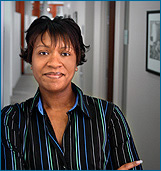
Nine years at CDC has reinforced in Ronda Starr that regardless of the division any employee works in, "We are all working toward the same goal, and professionalism and support are essential."
Starr, who joined CDC in 1997, in what was then the Division of Cancer Prevention and Control, takes that lesson to heart in her job providing administrative support within the Global Disease Detection Unit of the Coordinating Office for Global Health. "It takes a very skilled and ethically strong person to be successful as a secretary here," she says. "In many ways a secretary´s role is one of the most important in this agency," Starr adds, noting that it takes knowledge of budget, travel rules, and regulations. "You have to be an excellent communicator, and be versatile."
Prior to coming to CDC, Starr worked at Kaiser Permanente, where she dealt with all levels of staff and often had to deal with conflict. "Customer service was an extremely important part of my job at Kaiser and that skill is universal and extremely important here at CDC when dealing with outside agencies as well as internal staff."
A mother of three, Starr is an avid reader who has written her first novel that she hopes to get published by year-end.
*including sister agency ATSDR, housed in NCEH/ATSDR.
Page last modified: 2/7/2007
